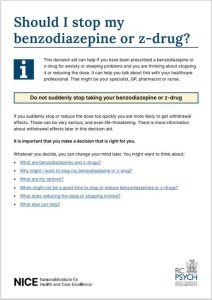

Click to download “Understanding your Benzodiazepine or Z Drug” Information Leaflet |
What are benzodiazepines and “Z” drugs and what are they used for?
Why are doctors reluctant to prescribe these tablets?
Problems with Benzodiazepine and Z drugs:
Drowsiness and clumsiness
They may affect how your muscles work or make you sleepy. Drowsiness may persist the following day. It is essential that you do not drive or use any tools or machines if you are affected in this way. Driving under the influence of these medicines is an offence. Take extra care if you get up during the night as there is a risk of falls and consequently injuries including hip fractures.
Memory Problems
They have been linked with memory problems such as Dementia and Alzheimer’s disease, particularly if used long-term.
Tolerance
If you take benzodiazepines or Z drugs regularly, the body becomes so used to them that they may lose their effectiveness and no longer help your original sleeping or anxiety problem. This is known as ‘tolerance’ and can develop within 3-14 days of continuous use.
Dependence
If you take a benzodiazepine or Z drug for a number of weeks or longer it is likely that you will experience withdrawal symptoms if you stop them suddenly. These may include:
• anxiety
• panic attacks
• odd sensations
• feelings of unreality
• feeling awful
• hearing and visual disturbance
• inability to sleep
• sweating
• headache
• tremor
• feeling sick
• palpitations
• muscle spasms
Taking with other substances
Do not drink alcohol while you are taking benzodiazepines or Z drugs. Taking some medicines along with benzodiazepines or Z drugs increases the risk of drowsiness, difficulties in breathing, coma and may be life-threatening. Examples of such medicines include:
• Opioids (e.g. morphine, tramadol, co-codamol, oxycodone, fentanyl)
• Epilepsy medicines
• Medicines that affect the liver (e.g. the antibiotic rifampicin)
• Moxonidine (for blood pressure)
• Muscle relaxants (e.g. baclofen, tizanidine)
If the medication combination is essential, please follow your doctor’s dose recommendation closely and seek medical attention if you experience the symptoms listed.
Could you stop your Benzodiazepine or Z Drug?
Reducing or stopping these medicines can have many benefits for your health:
• Improved memory and reaction times
• Higher levels of alertness and enjoyment of life
• More energy and ability to do things
Benzodiazepines and Z drugs shouldn’t be stopped suddenly. The dose should be reduced gradually before finally stopping. Talk to your doctor or pharmacist for advice.
Tips to help you stop
• Accept that you may have disturbed sleep when you are coming off the tablets but that this won’t last forever
• Ask your friends and family to support you in your effort to stop
• Consider joining a local self-help group for support or enquire about counselling
• Don’t replace the tablets with alcohol, smoking or other drugs
• Follow the ‘Good sleep Guide’ or the ‘Good Relaxation Guide’, in the Patient Zone of the Northern Ireland Formulary website
Other things that can help:
- Regular exercise
- Listening to music
- Learning relaxation techniques
- Reducing your caffeine intake
Further sources of help and advice
Your doctor, practice nurse or pharmacist will usually be able to advise on counselling and self-help groups in your local area or refer you to the Community Addiction Teams if you are having difficulty stopping your Benzodiazepine or Z drug. Alternatively the organizations listed below can be contacted directly by the public:
Ascert/Start 360
Tel: 0800 2545123
Tel: 028 9084 0555 (Belfast HSC Trust Area)
Tel: 028 2568 9306 ( Northern HSC Trust Area)
Tel: 0800 254 5123 (South Eastern HSC Trust Area)
Tel: 028 3832 2714 ( Southern HSC Trust Area)
Tel: 0800 254 5123 ( Western HSC Trust Area)
Useful websites
• www.mindingyourhead.info
• www.choiceandmedication.org/hscni
• www.nhs.uk/conditions/stress-anxiety-depression/improve-mental-wellbeing/
• www.postscript360.org.uk
• www.nhs.uk/every-mind-matters
• www.nhs.uk/conditions/insomnia
• www.mentalhealth.org.uk
• https://stresscontrol.org/
Reviewed and updated by: SPPG Pharmacy and Medicines Management Team Dec 23.
